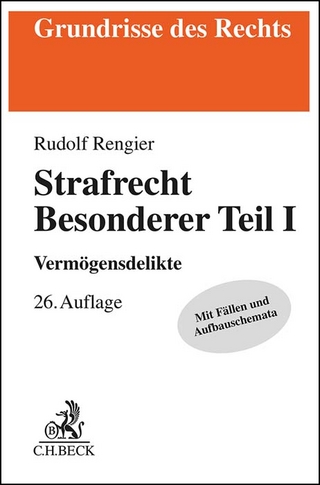
Routledge International Handbook of Critical Gang Studies
Routledge (Verlag)
978-1-138-61611-0 (ISBN)
Routledge International Handbook of Critical Gang Studies is rooted in the instability, inequality and liquidity of the post-industrial era. It understands the gang as a complex and contradictory phenomenon; a socio-historical agent that reflects, responds to and creates a certain structured environment in spaces which are always in flux. International in scope and drawing on a range of sociological, criminological and anthropological traditions, it looks beyond pathological, ahistorical and non-transformative approaches, and considers other important factors that produce the phenomenon, whether the historically entrenched racialized power structure and segregation in Chicago; the unconstrained state-abandoned development of favelas in Brazil; or the colonization, displacement and dependency of people in Central America. This handbook reflects and defines the new theoretical and empirical traditions of critical gang studies. It offers a variety of perspectives, including:
A view of gangs that takes into consideration the global context and appearance of the "gang" in its various forms and stages of development;
An appreciation of the gang as a socio-cultural formation;
A race-ethnic and class analysis of the gang that problematizes domain assumptions such as the "underclass";
Gender variations of the gang phenomenon with a particular emphasis on their intersectional properties;
Relations between gangs and the political economy that address the dominant mode of production and exchange;
Treatments that demonstrate the historically contingent nature of gangs and their changes across time;
The contradictory impact of gang repressive policies, institutions and practices as part of a broader discussion on the nature of the state in specific societies; and
Critical methodologies on gangs that involve discussions of visual and textual representations and the problematics of data collection and analysis.
Authoritative, multi-disciplinary and international, this book will be of interest to criminologists, sociologists and anthropologists alike, particularly those engaged with critical criminology/sociology, youth crime, delinquency and global social inequality. The Handbook will also be of interest to policy makers and those in the peacebuilding field.
David C. Brotherton is Professor of Sociology at the John Jay College of Criminal Justice and the Graduate Center at the City University of New York, where his research on youth resistance, marginalization and gangs led to the Street Organization Project in 1997. He has received numerous research grants from both private and public agencies and has published widely in journals, books, newspapers and magazines. Dr Brotherton currently co-directs the Social Change Project at the John Jay College of Criminal Justice and edits the Transgressive Studies book series at Temple University Press. In 2011 he was named Critical Criminologist of the Year and in 2015 was the recipient of the Praxis Award for contributions to social activism and justice. Rafael Jose Gude is a Research Fellow with the Social Change and Transgressive Studies Project at John Jay College of Criminal Justice, CUNY. He has done extensive fieldwork with gangs in both El Salvador and Ecuador, where much of his research has focused on developing viable alternatives to the war on gangs. He has an MPhil in Latin American Studies from the University of Oxford.
Critical Theories of the Gang 1.Utilizing Southern Criminology in the Global North: Applying Southern Criminology to Over-standings of English Gang Research 2.States of Emergency: Gangs, Benjamin, and the Challenge to Modern Sovereignty 3.The Birmingham School and Critical Gang Studies 4.The Gang as Secret Society 5.On Being Affected: Love, Law & Submission Among Gangsters 6.The Catholic Church and the Gangs: Toward a Liberationist Critique of Gang Violence 7.Gangs, space and the state: bringing Henri Lefebvre’s spatial theory to critical gang studies Critical Methodologies 8.Cultural Criminology and Gangs: Street Elitism and Politics in Late Modernity 9.Interviewing Gang Members: A Note on Research Design 10.New Standards for Social Practice Ethics? Researching Processes of Gang Exit with Former Gang Members 11.Filming (With) Gangs: An Essay on Visual Sociology in Barcelona 12.Why Gang Members are Dehumanized in Court 13.Gang Narratives and Race-Based Policing and Prosecution in New York City Policies and Repressive Models 14.Securitization and the Transnational Governing of Central American Gangs 15.Gangs and the Garrison State: (In)Security Politics and Democracy in Latin America 16.Misguided Strategy: New York City’s Decision to Criminalize Gangs 17.Off the Books and Off the Blocks:The Dual Economic Marginalization of Black Gang Members in Chicago 18.Responding to Exclusion in Hartford and the Evolution of a Gang Global Case Studies 19.The War on Gangs and Gangsters: The Latino/a Experience with Settler Colonialism 20.Indigenous Gangs in Western Canada 21.Transnationalism and Postnational Identities: The three lives of a Latin King 22.Race and Youth Gangs in France: Denial, Ambiguity, and Recognition 23.Performing ‘gang-ness’: the transformative "realness" of gang violence in the Netherlands 24.Stuck in Between: A Former Marero in the "European Capital" of Salvadoran Gangs 25.A Genealogy of Gangs in Hong Kong 26.Reimagining the Landscape of Gangs: Reflections from Bangladesh and China 27.Russian street gangs, their social construction and political use-value 28.The Fourth Corner of the Triangle: Gang transnationalism, fragmentation and evolution in Belize City 29.Gang governance in the Tropics: The political economy of violence and social order in contemporary Nicaragua 30.Understanding the dynamics and functions of gang violence: The case of El Salvador 31.The making of Central America’s Street Gangs 32.A Critical Criminology of Gangs and Organized Crime in Brazil 33.The Legalization of The Latin Kings in Ecuador: The Two Hands of The State, From the Production of Marginalization to Policies of Inclusion 34.Peace Processes in Ecuador 35.Gangs in the Post Chávez Bolivarian Revolution: How Mano Dura Policies and Political Pacts have Organized Crime in Venezuela 36.Gangs in Kenya: Work, Manhood and Security Culture and the Gang 37.Identity and Collective Resistance Among the Almighty Latin King and Queen Nation (New York) 38."They Treat Us Like Criminals in Front of our Kids": Gang-Affiliated Chicanas and Trails of Violence in the Barrio 39."The city got my back so the city on my back": Prisoner's Negation of the States’ Claims of Prisoner’s Humanity 40.Performance Narratives of Gang Identity and Membership 41.California Placaso: The Social Construction of Chicanx Gang Graffiti 42."Gangbangers are Gangbangers, Hustlers are Hustlers": The Rap Game, Social Media, and Gang Violence in Toronto Contexts and Spaces 43.Prison Gangs in the Northern Triangle: The Critical Contribution of Prison Studies to the Theory of Gangs 44.Doxa is Dangerous: How Academic Doxa Inhibits Prison Gang Research 45.Prison Gangs: Rise, Resistance and Reentry 46.A Legacy of Mapping Gang Neighborhoods in LA Critical Appraisals of Major Figures in Gang Research 47.Dwight Conquergood: An Appreciation of his Intellectual Life and Contribution to Critical Gang Studies 48.The Legacy of Joan Moore: A Revolution in Gang Research 49.The Legacy of James Diego Vigil: Rebelde Con Causa
| Erscheinungsdatum | 30.07.2021 |
|---|---|
| Reihe/Serie | Routledge International Handbooks |
| Zusatzinfo | 5 Tables, black and white; 4 Line drawings, black and white; 20 Halftones, black and white; 24 Illustrations, black and white |
| Verlagsort | London |
| Sprache | englisch |
| Maße | 174 x 246 mm |
| Gewicht | 1900 g |
| Themenwelt | Sachbuch/Ratgeber ► Gesundheit / Leben / Psychologie |
| Recht / Steuern ► EU / Internationales Recht | |
| Recht / Steuern ► Strafrecht ► Besonderes Strafrecht | |
| Recht / Steuern ► Strafrecht ► Kriminologie | |
| Sozialwissenschaften ► Pädagogik ► Sozialpädagogik | |
| Sozialwissenschaften ► Soziologie | |
| ISBN-10 | 1-138-61611-7 / 1138616117 |
| ISBN-13 | 978-1-138-61611-0 / 9781138616110 |
| Zustand | Neuware |
| Haben Sie eine Frage zum Produkt? |
aus dem Bereich


